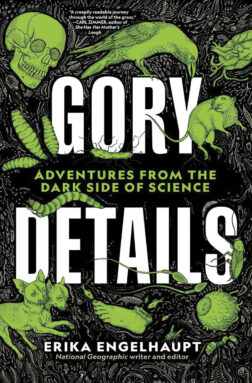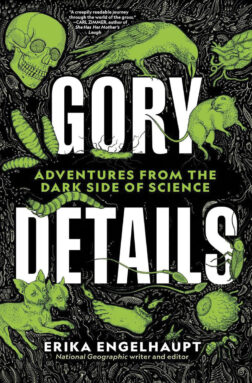This post was originally published on this site
Gory Details
Erika Engelhaupt
National Geographic, $26
We tend to turn away, physically or metaphorically, from things we find unsavory: leggy insects, bodily fluids, conversations about death. But just because something is disgusting, morbid or taboo shouldn’t keep us from learning about it — and could even be a cue that we should, posits science journalist Erika Engelhaupt.
In Gory Details, Engelhaupt takes on a range of such topics, everything from which mammals are most likely to murder members of their own species and the spotty history of research on female genitalia to how fecal transplants work and the psychology of why we find clowns creepy. She often uses science, history or both to break down what gives a particular topic its taboo or ick status. How else are you going to stop chills from running up your spine while reading about a woman who pulled 14 tiny worms out of her eye other than by learning the story of parasitic survival that landed them there?
Regular Science News readers might recognize Engelhaupt’s name: She was an editor at the magazine from 2009 to 2014. While here, Gory Details was born as a blog and later moved to National Geographic. The book includes updated and expanded versions of some blog posts, as well as plenty of new material.
Science News caught up with Engelhaupt to talk about the book. The following conversation has been edited for clarity and brevity.
SN: You’ve mentioned that when people learn your book title is Gory Details, they assume you write for kids.
Engelhaupt: Yes. At some point, people are expected to grow up and not be interested in gross things anymore, and I reject that. I think actually we all are interested in a wide variety of gross things. It’s a matter of how you frame it. We may love watching murder mysteries and true crime and CSI-type shows. We don’t necessarily think of ourselves as being morbid because of it. But when it comes to things like biology, anatomy and subjects that are taboo involving sex or death, we hold ourselves to a different standard. I want people to read this book and walk away feeling like, you know what? It’s OK to be curious about things that we have considered off-limits for polite conversation.
SN: Do you think you have a higher tolerance than most for “gross” topics?
Engelhaupt: There is a quiz that you can take to see how easily disgusted you are. I’m totally average. I think maybe that’s part of why I’m so interested in these topics, because they gross me out just as much as everyone else.
SN: You went to a conference on edible insects. This seemed like it was right at your limit of what you were willing to do in the name of Gory Details.
Engelhaupt: It was. I felt the need to go where all of the scientists would be and really learn why they think we’re all going to be eating more insects in 20 years. It was a challenge for me. There’s a little bit of a thrill in doing something like eating that first mealworm. You know it’s not actually going to hurt you, but it’s gross and it’s new and it is exciting. The biggest challenge was the silkworm pupa, which was large and segmented and just looked so … insecty.
SN: Do you have a favorite reporting field trip?
Engelhaupt: Probably the most fun travel I did for the book was going to biologist Rob Dunn’s lab at North Carolina State University to find my own face mites. There are two species of little eight-legged mites that live on all of our faces — and elsewhere on our bodies, by the way. Seeing something that was living in my pores squiggling around on the microscope slide — for me, there’s nothing more fun than that. I still keep pictures on my cell phone of my face mites so that I can show them to people.
SN: You write about “delusions of infestation,” where people believe their bodies are teeming with insects. I was struck by the stories of people with this condition, and that they seemed to have no other mental illness.
Engelhaupt: A delusion is just a fixed idea that’s incorrect. When you hear that someone is delusional, you might think they’re schizophrenic or psychotic. There can be cases where there’s overlap with mental illness, but a lot of cases start off in a normal way. A person feels an itch, there’s a real physical sensation. It’s not too hard to imagine they’d think something is crawling on them and that it could be insects. It becomes extremely important to the person to convince people that they’re right and not crazy. So the person gets deeper and deeper into [the delusion], and it becomes harder and harder to get them to accept treatment.
There are antipsychotic drugs that can help people let go of the idea and treatments that can solve underlying problems — skin problems, for example, or nerve problems that can cause the sensations. [Treatment with antipsychotics] makes it all sound very scary. That’s one reason this problem goes so unrecognized and untreated — because of the stigma around mental illness and because it seems like people must be crazy. Our squeamishness and fear of people who are experiencing this, our deep discomfort with it, has really created a trap for people.
SN: You also write about a lot of new scientific research. Any standout papers where you thought, I have to write about this?
Engelhaupt: A study where scientists fed different human bodily fluids to blowflies to see which ones the flies found tastiest. [The scientists] were looking at how flies might transfer human DNA picked up from bodily fluids to different parts of a crime scene. [DNA analysis] techniques are now so sensitive that we’re picking up DNA from fly poop. If the flies have previously eaten human blood or semen or saliva, there can be DNA from that person that gets pooped out by the fly. That [DNA] might get interpreted as blood spatter or get picked up incidentally at a crime scene and really confuse the situation. Who would have thought that you need to study fly poop to analyze DNA at a crime scene?
SN: I was sure you were going to say the paper on the calorie count of a human, from the chapter on cannibalism.
Engelhaupt: That’s one where it was a question I didn’t know I had until I saw that a scientist had answered it. And those are some of the kinds of things that I wanted to fill this book with: You didn’t know you wanted to know this, but I’m hoping that now you’re glad you do.
Buy Gory Details from Bookshop.org. Science News is a Bookshop.org affiliate and will earn a commission on purchases made from links in this article.

